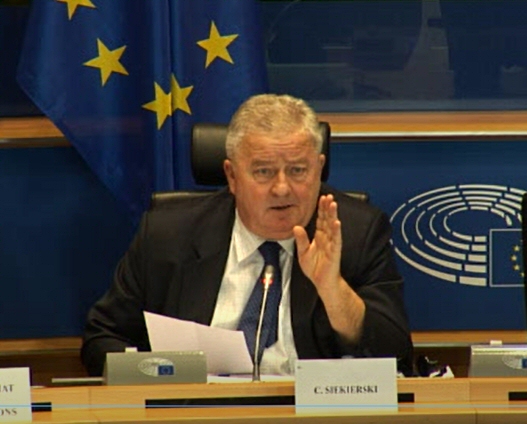On 5 December last, COMAGRI had a first exchange of views on the so-called “Omnibus” proposal for a Regulation on the financial rules applicable to the general budget of the Union and amending a number of sectoral regulations. In my previous post, I flagged that this legislation provided the first opportunity to make changes to the CAP basic acts since the 2013 CAP reform was concluded.
It was thus interesting to listen to the mood of the Committee as the co-rapporteurs for the opinion, Albert Dess (EPP) and Paolo De Castro (S&D) introduced the discussion (a video of the discussion can be viewed here, beginning at 16:07).
The general tenor of the remarks from the COMAGRI co-rapporteurs as well as other contributors to the debate was that the Committee should adopt a narrow interpretation of its powers to amend the proposal, keeping in mind that its purpose is to deliver simplification of the CAP both for managing authorities and for farmers.
Albert Dess noted that the proposed Regulation did not provide an opportunity for a reform of the 2013 reform, but rather a correction. De Castro warned that COMAGRI should not undermine the political agreement of June 2013 while noting the possibility of doing some work on the Commission proposals.
Michel Dantin, who noted that further options were needed in the risk management area, also concluded that these should be based on the Commission’s proposal. Martin Häusling, who also highlighted risk management as needing attention, warned that the Committee should focus on core issues and not wax lyrical. He noted the risk that the Committee might want to do too much, and become a victim of its good intentions.
De Castro laid out some specific guidelines. He noted that COMAGRI should not make changes that have financial implications, as otherwise the Regulation cannot come into force in 2018 as is planned. He also noted that amendments can be made not only to the articles which the Commission has proposed to change, but that the Committee can also intervene through amendments where the same principles apply to other aspects of the CAP. However, he stressed that there must be some link to the Commission’s intervention logic, and that it is not possible to open up completely new chapters.
Specifically, De Castro seemed to rule out substantive changes to greening where the Commission has made no specific proposals, noting that the discussions on the Commission’s Communication on the CAP post-2020 expected late next summer would provide the opportunity to take up that discussion.
Nonetheless, a wish to simplify greening has been expressed by a number of stakeholders. And in my previous post I noted I would not be surprised to see some amendments proposed in this area, even if De Castro’s remarks suggests these will not come from the co-rapporteurs.
Albert Dess stressed the tight timetable. According to him, it seems the co-rapporteurs’ draft report should already be completed by the end of this week in order to be ready for translation first thing in the New Year. Update 21 December: While the English translation refers to the draft opinion being ready by the end of the year, the German original version in fact suggests end February for the delivery of the draft opinion. A preliminary discussion of the report would be held in the AGRI Committee in late March with the end of March the deadline for amendments from Committee members.
This would be followed by a debate and vote in COMAGRI in April so that COMAGRI’’s work would be completed by the beginning of May. The vote on the Commission’s proposal and amendments will take place in the plenary in Parliament in June, followed by the trilogue process with the Council. This process must be completed by around September, if time is to be given to the Member State management agencies to modify their systems to allow the changes to take effect by 1 January 2018.
The trilogue process will be held with the AGRIFISH Council President on the CAP-related amendments, although the ECOFIN Council has the overall responsibility for the dossier together with the Budgets Committee in the Parliament.
This is a very tight schedule which does not allow much scope for creative thinking. Nonetheless, it remains to be seen how AGRI Committee members interpret the notion of a ‘correction’ of the reform.
This post was written by Alan Matthews


